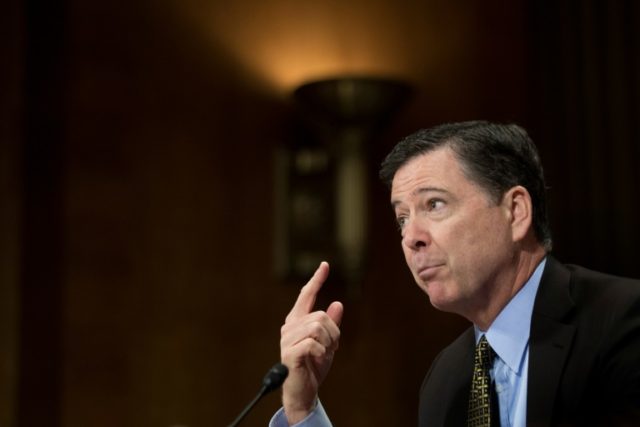Amid a New York Times report – denied by the White House – that President Trump tried during a private meeting to convince then-FBI Director Comey to drop an investigation into fired national security adviser Michael Flynn, it may be instructive to recall reports of Obama administration officials allegedly meddling in Comey’s FBI affairs.
In one case, White House officials, according to one source speaking to the news media, reportedly “shut it down,” referring to a request by Comey to go public with FBI information regarding alleged Russian meddling in the 2016 presidential election.
The reports come despite Obama administration attempts to portray Comey’s role as head of the FBI as independent of any influence from the executive branch.
Indeed, when Obama first met with Comey to discuss the possibility of appointing him to lead the FBI, a source with knowledge of the meeting told CNN that the president made it a point not to meet with Comey one-on-one again for fear of creating the appearance of influence.
“This was (Obama’s) policy with the FBI director and with judicial appointees,” the source said to CNN. “He felt the White House should have a clear separation from the FBI about ongoing investigations – there should never be any intimation that the President or the White House staff was leaning in and trying to influence live investigations by the FBI,” the source said.
Fast forward to March, when Newsweek reported that Comey wanted to first go public as early as the summer of 2016 about the agency’s information on alleged Russian interference in the presidential campaign. However, Obama administration officials blocked Comey from making public statements, according to two sources with knowledge of the matter speaking to Newsweek.
“The White House shut it down,” one source told the magazine, explaining that Comey had pitched the idea of writing an oped about the subject during a White House Situation Room meeting in June or July.
“He had a draft of it or an outline. He held up a piece of paper in a meeting and said, ‘I want to go forward. What do people think of this?’” the source said. The source told Newsweek the meeting was attended by Secretary of State John Kerry, Attorney General Loretta Lynch, Department of Homeland Security Secretary Jeh Johnson and National Security Adviser Susan Rice.
Continued the report:
But many in the room didn’t like the idea, and White House officials thought the announcement should be a coordinated message backed by multiple agencies, the source says. “An op-ed doesn’t have the same stature. It comes from one person.”
This is not the only time a member of the Obama administration reportedly influenced a decision by Comey.
According to an extensive report in the New York Times, Attorney General Lynch, an Obama appointee, convinced Comey to use the word “matter” instead of “investigation” when the FBI director publicly addressed the criminal investigation into Hillary Clinton’s use of a private email server. This despite the Justice Department knowing the FBI probe was not only an official investigation but a criminal investigation.
Comey reportedly caved in and called the investigation a “matter” even though, according to the Times, Comey was aware of the existence of a document written by a Democratic operative that allegedly indicated Lynch would have protected Clinton in the email probe. The newspaper reported that “Mr. Comey believed (Lynch) had subtly helped play down the Clinton investigation.”
The Times reported on a meeting between FBI and Justice officials at which, according to the newspaper’s characterization, “Lynch told him (Comey) to be even more circumspect: Do not even call it an investigation, she said, according to three people who attended the meeting. Call it a ‘matter.’”
Continued the Times’ report:
Ms. Lynch reasoned that the word “investigation” would raise other questions: What charges were being investigated? Who was the target? But most important, she believed that the department should stick by its policy of not confirming investigations.
It was a by-the-book decision. But Mr. Comey and other F.B.I. officials regarded it as disingenuous in an investigation that was so widely known. And Mr. Comey was concerned that a Democratic attorney general was asking him to be misleading and line up his talking points with Mrs. Clinton’s campaign, according to people who spoke with him afterward.
As the meeting broke up, George Z. Toscas, a national security prosecutor, ribbed Mr. Comey. “I guess you’re the Federal Bureau of Matters now,” Mr. Toscas said, according to two people who were there.
Even though Comey reportedly had concerns about Lynch’s motivations, he went along and did not call the criminal investigation an investigation.
“I am confident we have the resources and the personnel assigned to the matter,” Comey stated mere days after the meeting with Lynch.
Aaron Klein is Breitbart’s Jerusalem bureau chief and senior investigative reporter. He is a New York Times bestselling author and hosts the popular weekend talk radio program, “Aaron Klein Investigative Radio.” Follow him on Twitter @AaronKleinShow. Follow him on Facebook.
With additional research by Joshua Klein.

COMMENTS
Please let us know if you're having issues with commenting.